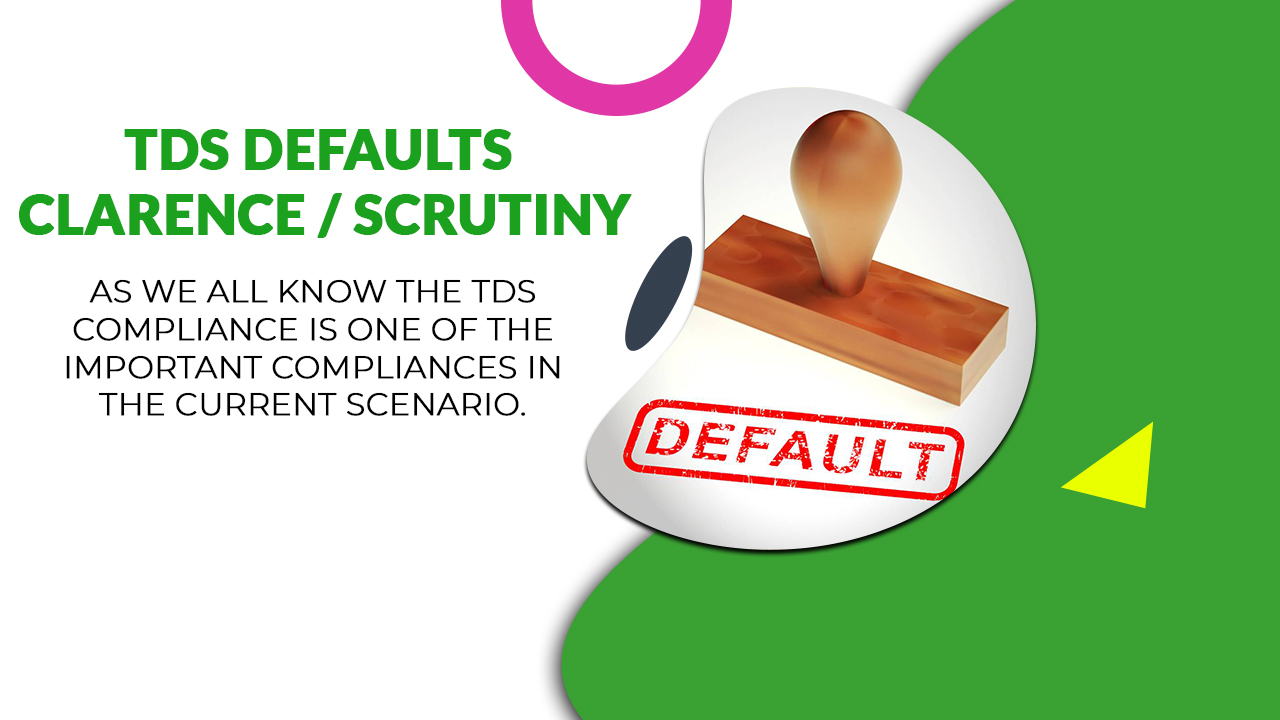TDS Defaults Clearence / Scrutiny - Overview
As we all know the TDS compliance is one of the important compliances in the current scenario. Many of the taxpayers are not as compliant and hence they face adverse consequences, penalty or prosecution on case to case basis. Hence today in this article we shall be guiding you through the TDS compliances and consequent penalty, prosecution, and adverse compliances faced by the assessee due to non-compliance of TDS.
Track Your Status
TDS Defaults Clearence / Scrutiny Registration Package
Get Quote
- What we provide
- Documents required
- Free Consultancy
- TDS Certificate
- Delivery in 3 Days
- All Documents Related to TDS Clarence and Scrutiny
List of TDS Defaults
1. INTEREST LIABILITY:
Section 201(1A): This includes Interests on Failure to Deduct Tax, and Interests on Failure to Deposit Deducted Tax Amount.
Fail to deduct TDS – 1% from the due date of deduction till the date of deduction
Fail to Deposit TDS – 1.5% from the date of deduction till the date of payment
Section 220(2): Interests on Failure to Pay The Amount Demanded under section156 of TDS Act, Issued By Way of Notice of Demand.
1% of the gross value from the due date of payment of demand (due date for payment of demand shall be 30 days from the date of notice of demand).
2. LATE FEE UNDER SECTION 234E:
The Deductor or the Collector would be liable to pay a late fine for non-filing, late filing of TDS, TCS returns as per provisions of section 234E of the Income Tax Act.
In case of default in filing of TDS / TCS return, a late fee of Rs 200/day shall be payable by the defaulter till the return is cleared. The maximum amount of late fees cannot be more than the amount of tax-deductible (TDS) or collectible (TCS),
It is important to remember that the provisions of section 234E of the Income Tax Act clearly state that in case of delay, the applicable late fee is to be paid before filing the delayed TDS or TCS return.
3. PENALTY:
(a) Section 271C: Penalty for failure to deduct tax at source
Failure to deduct tax partially or completely
- - According the provisions of Chapter XVIIB, or
- - As per section 115-O(2) or
- - As per second provision to section 194B
- - Penalty of the sum equal to the quantity of tax which was required to be deducted or paid shall be payable. Any penalty must be imposed by the Joint Commissioner.
(b) Section 271H: Penalty for failure to furnish the statements
A person is liable to pay a penalty:
- - On Failing to deliver a statement within the time specified in section 200(3)
- - On Failing to deliver a statement within the time specified in section 200(3) or
- - Due to Misinformation within the statement which is required to be delivered
The penalty payable must be an amount which shall not be less than Rs. 10,000 and more than Rs. 1,00,000
(C) Section 272A(2)(g) – Penalty For Failure to provide a Certificate
If the taxpayer fails to provide a certificate as required by section 203 (i.e. Form 16 or Form 16A), shall be liable to pay Rs.100 for every day until the failure is settled.
4. PROSECUTION UNDER SECTION 276B:
On failing to pay tax to the credit of the government of India under Chapter XII-D or XVII-B:
If a person deducts tax at source etc, but fails to pay an equivalent to the credit of Central Government as prescribed, he is often sentenced to rigorous imprisonment for a term not less 3 months and extendable upon 7 years with a fine as well.
5. OTHER CONSEQUENCES OF TDS DEFAULT:
No allowance of expenditure u/s 40(a)(ia)
- - On failing to deduct tax on interest, commission, brokerage, rent, royalty or professional fees, etc.
- - Having deducted, failure to pay the tax deducted within the dates prescribed or before the maturity of filing the return of income u/s 139(1), leads to disallowance of expenditure
- - If tax is deducted & paid in the subsequent year, or paid after the end of the previous year but after the due date of return u/s 139(1) then the expenditure is deductible in that year.
Need Consultancy? Ask Tax Seva Kendra Expert@ Rs. FREE
- Free Consultancy
- Online Documentation
- Anywhere In India





